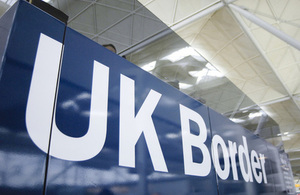Immigration minister says differentiation policy to be paused from July in wake of stronger Illegal Migration Bill
In an important written statement issued today, immigration minister Robert Jenrick has announced that the two-tier refugee system introduced by the Nationality and Borders Act 2022 will be paused from July 2023.
 Image credit: UK GovernmentThe two-tier approach differentiated between asylum seekers entering the UK by regular and irregular routes. It drew widespread condemnation, including by the United Nations High Commissioner for Refugees (UNHCR).
Image credit: UK GovernmentThe two-tier approach differentiated between asylum seekers entering the UK by regular and irregular routes. It drew widespread condemnation, including by the United Nations High Commissioner for Refugees (UNHCR).
Announcing the forthcoming pause of the policy, Robert Jenrick said the new, stronger approach of the Illegal Migration Bill tackles the same issue that the two-tier differentiation policy sought to address.
Jenrick added that people who have already received a second-tier 'Group 2' or humanitarian protection decision under post-28 June 2022 policies will have their conditions aligned to 'Group 1' refugees.
Jon Featonby of the Refugee Council noted on Twitter that the pausing of the policy is largely because it will be mostly redundant after the Illegal Migration Bill comes into effect, but it is good news for those who have been given Group 2 status.
Colin Yeo of Garden Court Chambers and Free Movement said today's announcement "buries one of the last vestiges of former Home Secretary Priti Patel's 'landmark' Nationality and Borders Act 2022" which was only introduced less than one year ago. Yeo said said the counterproductive two-tier system failed in its purpose to create a deterrent and simply created much more work for the Home Office.
Robert Jenrick also announced today that the streamlined asylum processing model announced on 23 February 2023 (for people from Afghanistan, Eritrea, Libya, Syria and Yemen) will be extended to claims made between 28 June 2022 and the introduction of the Illegal Migration Bill on 7 March 2023 and will now include claimants from Sudan.
The immigration minister's full written statement follows below:
Statement
Provisions within the Nationality and Borders Act 2022 (NABA), which came into force on 28 June 2022, set out the framework to differentiate between two groups of refugees who ultimately remain in the UK: "Group 1" and "Group 2".
The primary way in which the Groups are differentiated is the grant of permission to stay: Group 1 refugees are normally granted refugee permission to stay for five years, after which they can apply for settlement, whereas Group 2 refugees are normally granted temporary refugee permission to stay for 30 months on a 10-year route to settlement.
The differentiation policy was intended to disincentivise migrants from using criminal smugglers to facilitate illegal journeys to the UK. This was the right approach. Since then, the scale of the challenge facing the UK, like other countries, has grown – and that is why the Government introduced the Illegal Migration Bill. The Bill goes further than ever before in seeking to deter illegal entry to the UK, so that the only humanitarian route into the UK is through a safe and legal one. The Bill will radically overhaul how we deal with people who arrive in the UK illegally via safe countries, rendering their asylum and human rights claims (in respect of their home country) inadmissible and imposing a duty on the Home Secretary to remove them. This approach represents a considerably stronger means of tackling the same issue that the differentiation policy sought to address: people making dangerous and unnecessary journeys through safe countries to claim asylum in the UK.
We will therefore pause the differentiation policy in the next package of Immigration Rules changes in July 2023. This means we will stop taking grouping decisions under the differentiated asylum system after these Rules changes and those individuals who are successful in their asylum application, including those who are granted humanitarian protection, will receive the same conditions. Our ability to remove failed asylum applicants remains unchanged.
Individuals who have already received a "Group 2" or humanitarian protection decision under post-28 June 2022 policies will be contacted and will have their conditions aligned to those afforded to "Group 1" refugees. This includes length of permission to stay, route to settlement, and eligibility for Family Reunion.
On 23 February 2023 the Home Office announced the streamlined asylum processing model for a small number of cases of nationalities with high asylum grant rates: Afghanistan, Eritrea, Libya, Syria, Yemen. Because this model focuses on manifestly well-founded cases, positive decisions can be taken without the need for an additional interview. No one will have their asylum application refused without the opportunity of an additional interview. Those claims made between 28 June 2022 and the date of introduction of the Illegal Migration Bill (7 March 2023) will be processed according to this model. This will also include claimants from Sudan. Sudanese legacy claimants are already being processed in-line with established policies and processes and will be decided in-line with the Prime Minister's commitment to clear the backlog of legacy asylum claims by the end of 2023.